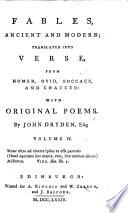Quotes from book
Fables, Ancient and Modern

Fables, Ancient and Modern is a collection of translations of classical and medieval poetry by John Dryden interspersed with some of his own works. Published in March 1700, it was his last and one of his greatest works. Dryden died two months later.
“She hugged the offender, and forgave the offense:
Sex to the last.”
Source: Fables, Ancient and Modern (1700), Cymon and Iphigenia, Lines 367–368.
“Joy rul'd the day, and Love the night.”
Source: Fables, Ancient and Modern (1700), The Secular Masque (1700), Line 82.
“The fool of nature stood with stupid eyes
And gaping mouth, that testified surprise.”
Source: Fables, Ancient and Modern (1700), Cymon and Iphigenia, Line 107.
“Old as I am, for ladies' love unfit,
The power of beauty I remember yet.”
Source: Fables, Ancient and Modern (1700), Cymon and Iphigenia, Lines 1–2.
“When beauty fires the blood, how love exalts the mind!”
Source: Fables, Ancient and Modern (1700), Cymon and Iphigenia, Line 41.
“A satirical poet is the check of the laymen on bad priests.”
Preface to the Fables.
Fables, Ancient and Modern (1700)
“Chaucer followed Nature everywhere, but was never so bold to go beyond her.”
Preface to the Fables.
Fables, Ancient and Modern (1700)
“He trudged along unknowing what he sought,
And whistled as he went, for want of thought.”
Source: Fables, Ancient and Modern (1700), Cymon and Iphigenia, Lines 84-85.
“Of seeming arms to make a short essay,
Then hasten to be drunk — the business of the day.”
Source: Fables, Ancient and Modern (1700), Cymon and Iphigenia, Lines 407–408.
“The sword within the scabbard keep,
And let mankind agree.”
Source: Fables, Ancient and Modern (1700), The Secular Masque (1700), Lines 61–62.
“A very merry, dancing, drinking,
Laughing, quaffing, and unthinkable time.”
Source: Fables, Ancient and Modern (1700), The Secular Masque (1700), Lines 38–39.
“Love taught him shame; and shame, with love at strife,
Soon taught the sweet civilities of life.”
Source: Fables, Ancient and Modern (1700), Cymon and Iphigenia, Line 133.